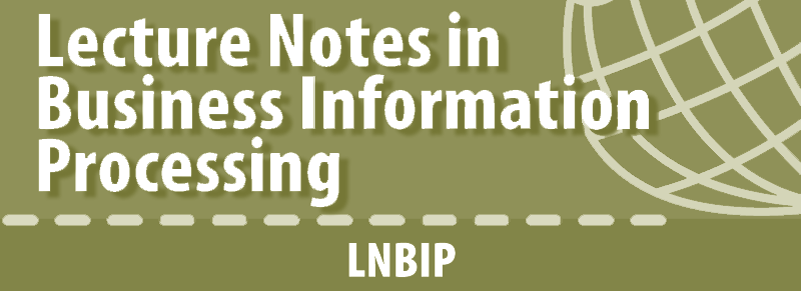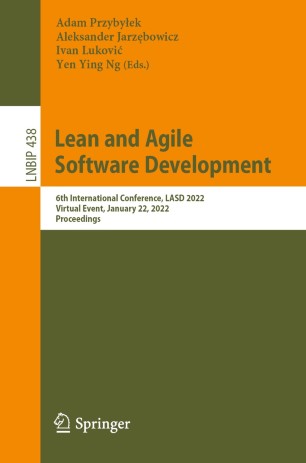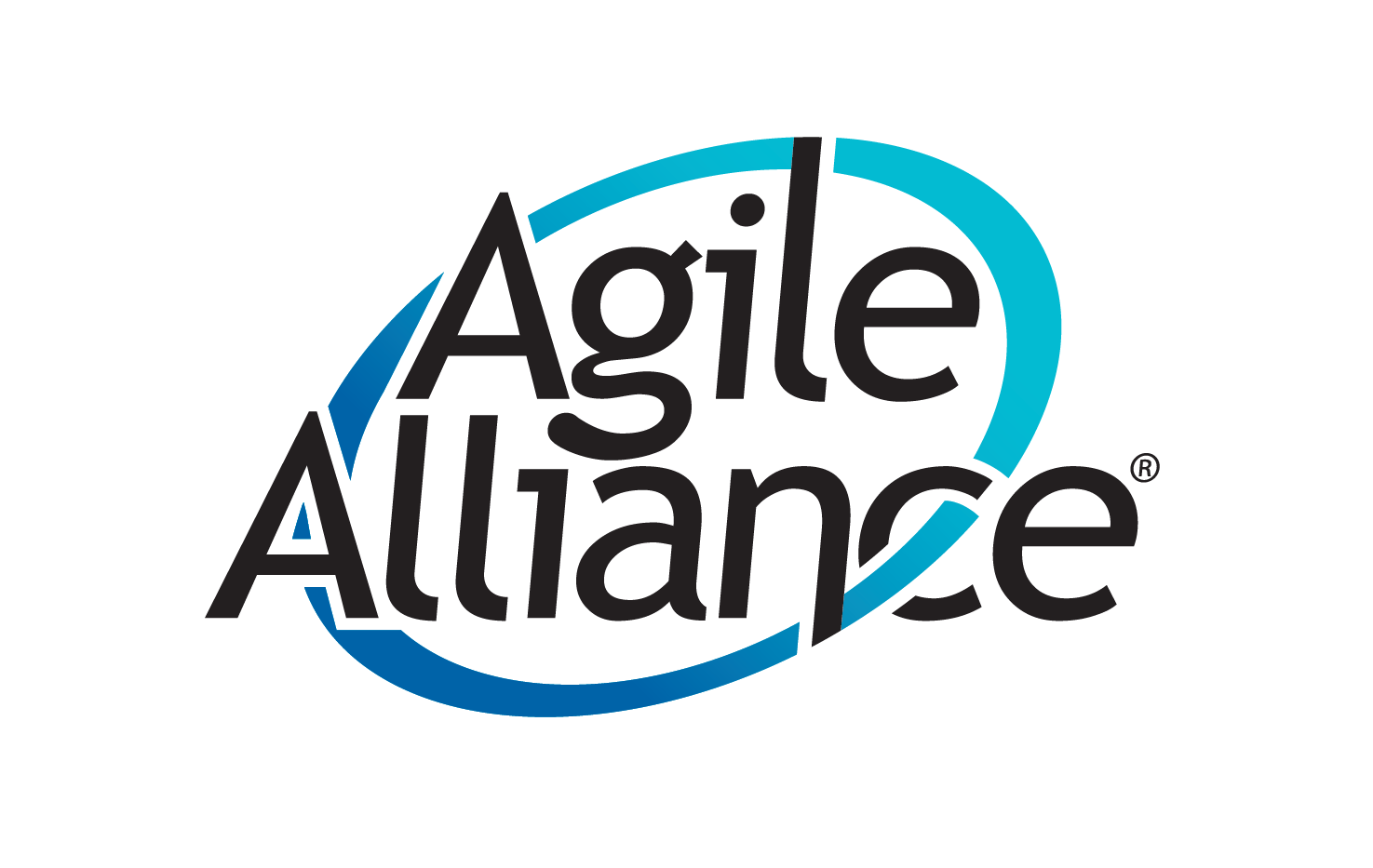LASD 2022
6th International Conference on Lean and Agile Software Development
22 January, 2022, Online event*
Free of charge, with Springer LNBIP proceedings!
Corresponding authors of 15 top-rated accepted papers will get complimentary 1 year membership in Agile Alliance!
*The conference will consist of pre-recorded presentations, live keynote, and Q&A sessions.
About
The evolution of software development methods is driven by the perennial quest on how to organize projects for better productivity. Plan-driven methods recommend spending much effort and resources to comprehensively capture all requirements and elaborate a big up-front design. Although they succeeded in projects where all properties of the software system could be specified in detail, they were unable to meet the dynamism, unpredictability and changing conditions that characterize today's competitive business environment. Thereby, traditional methods were superseded by lightweight methods based on iterative and incremental software development, frequent feedback from the customer, and an agile mindset. Agile methods have not only acknowledged that business requirements change, but also that customers are unable to definitively express their needs up front. Accordingly, agile teams start with a small set of core requirements to initiate the project and develop a working product. This working product becomes the basis for further discussions with the customer and new features are incrementally deliver on top of it. Later on, the software industry also started to adopt practices from lean manufacturing as a means of further waste elimination by removing all non-value-adding activities.
While agile as well as lean software development has already become mainstream in industry and a strong community has crystallized around the new way of thinking, making the transition to the new mindset is still challenging for many companies. Thereby, the practical implementation of Scrum, Kanban or other method often deviates from the proposed framework. Such misalignment usually hides some dysfunctions which, if removed, would allow the company to take full advantage of the agile method.
Besides, even though agile methods were originally designed for single, small teams, many organizations have increasingly adopted them in large-scale projects with multiple development teams. Scaling agile software development is complex and brings new challenges, including:
- coordination and communication between teams;
- coordination of distributed projects;
- lack of up-front architecture;
- adoption of agile methods in units other than software development departments, such as product management, marketing, and sales.
The objective of LASD is to extend the state-of-the-art in lean and agile software development and spread best practices and stories of successful transitions. Our conference has become a prominent forum where practitioners, researchers, and academics meet to share and discuss their concerns, experience, and research findings.
Topics and Interests
Submissions
We invite research papers in two categories: Full Papers (14-18 pages), and Short Papers (up to 8 pages). Papers must be in English and present original, not already published research. Authors should consult Springer's authors' guidelines and use their proceedings templates, either for LaTeX or for Word, for the preparation of their papers:
https://www.springer.com/gp/authors-editors/conference-proceedings/conference-proceedings-guidelines
Springer encourages authors to include their ORCIDs in their papers. In addition, the corresponding author of each paper, acting on behalf of all of the authors of that paper, must complete and sign a Consent-to-Publish form. The corresponding author signing the copyright form should match the corresponding author marked on the paper. Once the files have been sent to Springer, changes relating to the authorship of the papers cannot be made.
Submission is done through the EasyChair Conference System. After the paper submission has been successfully completed, authors will receive an automatic confirmation e-mail.
Each submission will be reviewed by at least three program committee members. To facilitate the double-blind reviewing, authors are kindly requested to provide the paper WITHOUT any reference to any of the authors, including the authors' personal details, the acknowledgments section of the paper and any other reference that may disclose the authors' identity.

Accepted papers will be published in the conference proceedings by Springer in their Lecture Notes on Business Information Processing (LNBIP) series. LNBIP volumes are made available to the following indexing services: Web of Science; Scopus, EI Engineering Index; ACM Digital Library; DBLP; Google Scholar. The proceedings will be available at: https://link.springer.com/conference/lasd.
An extended version of the best papers will be forwarded for further procedure in Computer Science and Information Systems (ComSIS, IF: 1.167) and Journal of Computer Languages (Cola, IF: 1.271).
Corresponding authors of accepted papers are required to upload a pre-recorded video of their paper presentation to YouTube or other video-sharing platform and send the uploaded video link via email to the conference chair. The presentations will be available 2 weeks before the conference. During the conference, the authors must be available online to interact with attendees for questions and answers.
There are a lot of tools available to easily record a presentation. By using these tools, you can show your face via webcam and display your slides as you talk. Please, explore the links below for detailed instructions:
Important dates
Paper submission (hard deadline)October 1, 2021
Reviews dueOctober 31, 2021
Author notificationNovember 4, 2021
Final paper submission (hard deadline)November 25, 2021
Pre-recorded video submissionDecember 31, 2021
Conference dateJanuary 22, 2022
Keynotes
Markus Borg
- Keynote title
- Agility in Software 2.0 – Notebook Interfaces and MLOps with Buttresses and Rebars
- Short Biography
- Dr. Markus Borg is a senior researcher with RISE Research Institutes of Sweden AB. He is also an adjunct lecturer at Lund University from where he obtained a PhD in software engineering in 2015. His research interests include empirical software engineering, machine learning, and software testing. Before embarking on the research career, Markus worked at ABB as a software engineer in safety-critical process automation. Markus is also a board member of Swedsoft, an independent non-profit organization with the mission to increase the competitiveness of Swedish software.
Raman Ramsin
- Keynote title
- Promises of Model-Driven Development in an Agile Context
- Short Biography
- Dr. Raman Ramsin is with Sharif University of Technology, Iran. He received his PhD in Computer Science from the University of York, UK, in 2006. As a lecturer, his graduate and undergraduate courses span the process-related areas of software engineering, including software development methodologies, patterns in software engineering, object-oriented analysis and design, and agile methods. His recent research focuses on situational method engineering, agile development, and model-driven engineering.
Program and Proceedings

Lean and Agile Software Development
6th International Conference, LASD 2022, Virtual Event, January 22, 2022, Proceedings
LNBIP, volume 438
Time zone of the conference: GMT+1 (Central European Standard Time)
Current Time:
| Saturday, Jan. 22 | Session 1 |
|---|---|
| 11:05 - 11:10 | Connectivity and Webex testing |
| 11:10 - 11:20 | Conference opening; Adam Przybyłek |
| 11:20 - 12:15 | Promises of Model-Driven Development in an Agile Context; Raman Ramsin |
| 12:15 - 13:00 | Q&A:
|
| Break | |
| Saturday, Jan. 22 | Session 2 |
| 14:00 - 14:55 | Agility in Software 2.0 – Notebook Interfaces and MLOps with Buttresses and Rebars Markus Borg |
| 14:55 - 15:40 | Q&A:
|
| 15:40 - 15:50 | Conference closing; Ivan Luković
|
Program Commitee
Ahmad, Muhammad Ovais
Sweden, Karlstad UniversityAkman, Ibrahim
Turkey, Atilim UniversityAlmeida, Fernando
Portugal, University of Porto & INESC TECAlshayeb, Mohammad
Saudi Arabia, King Fahd University of Petroleum and MineralsBagnato, Alessandra
France, SOFTEAM R&D DepartmentBehutiye, Woubshet
Finland, University of OuluBen Ayed Elleuch, Nourchène
UAE, Higher Colleges of Technology, ADWBernhart, Mario
Austria, Vienna University of TechnologyBhadauria, Vikram
USA, Texas A&M University TexarkanaBiró, Miklós
Austria, Software Competence Center Hagenberg and Johannes Kepler University LinzBlech, Jan Olaf
Finland, Aalto UniversityBorg, Markus
Sweden, SICS Swedish ICT ABBuchalcevova, Alena
Czech Republic, Prague University of Economics and BusinessBuchan, Jim
New Zealand, Auckland University of TechnologyBuglione, Luigi
Italy, Engineering Ingegneria Informatica SpAButt, Shariq Aziz
Pakistan, University of LahoreCruzes, Daniela
Norway, Norwegian University of Science and TechnologyDaszczuk, Wiktor Bohdan
Poland, Warsaw University of TechnologyDejanović, Igor
Serbia, University of Novi SadDerezinska, Anna
Poland, Warsaw University of Technology, Institute of Computer ScienceDiebold, Philipp
Germany, Bagilstein GmbHDutta, Arpita
Singapore, National University of SingaporeEscalona Cuaresma, Maria Jose
Spain, Universidad de SevillaEssebaa, Imane
Morocco, Hassan II University of CasablancaFigueira Filho, Fernando Marques
Brazil, Universidade Federal do Rio Grande do NorteGarcía-Mireles, Gabriel Alberto
Mexico, Universidad de SonoraGawin, Bartłomiej
Poland, University of GdańskGhofrani, Javad
Germany, University of LübeckGoczyła, Krzysztof
Poland, Gdańsk University of TechnologyGodboley, Sangharatna
India, NIT RourkelaGonzalez Huerta, Javier
Sweden, Blekinge Institute of TechnologyGregory, Peggy
United Kingdom, University of Central LancashireHanslo, Ridewaan
South Africa, Council for Scientific and Industrial ResearchHeil, Sebastian
Germany, Chemnitz University of TechnologyHinderks, Andreas
Spain, University of SevilleHohenstein, Uwe
Germany, Siemens AGHohl, Philipp
Germany, ZF Friedrichshafen AGIkonen, Marko
Finland, Projektivarikko OyInayat, Irum
Pakistan, National University of Computer and Emerging SciencesJanes, Andrea
Italy, Free University of BolzanoJärvinen, Janne
Finland, F-Secure CorporationJarzębowicz, Aleksander
Poland, Gdańsk University of TechnologyKakarontzas, George
Greece, Aristotle University of ThessalonikiKaloyanova, Kalinka
Bulgaria, Sofia UniversityKapitsaki, Georgia
Cyprus, University of CyprusKarolyi, Matěj
Czech Republic, Masaryk UniversityKatić, Marija
United Kingdom, Birkbeck, University of LondonKhlif, Wiem
Tunisia, University of SfaxKopczyńska, Sylwia
Poland, Poznań University of TechnologyKropp, Martin
Switzerland, University of Applied Sciences and Arts Northwestern SwitzerlandKuvaja, Pasi
Finland, University of OuluLaanti, Maarit
Finland, NitorLenarduzzi, Valentina
Finland, LUT UniversityLiebel, Grischa
Iceland, Reykjavik UniversityLuković, Ivan
Serbia, University of BelgradeLunesu, Ilaria
Italy, Università degli Studi di CagliariŁukasiewicz, Katarzyna
Poland, Gdańsk University of TechnologyMahnič, Viljan
Slovenia, University of LjubljanaMangalaraj, George
USA, Western Illinois UniversityMarcinkowski, Bartosz
Poland, University of GdańskMatthies, Christoph
Germany, Hasso Plattner Institute at the University of PotsdamMazzara, Manuel
Russia, Innopolis UniversityMesquida Calafat, Antoni-Lluís
Spain, University of the Balearic IslandsMiler, Jakub
Poland, Gdańsk University of TechnologyMiller, Gloria
Germany, MaxmetricsMisra, Sanjay
Nigeria, Covenant UniversityMohapatra, Durga Prasad
India, NIT RourkelaMorales Trujillo, Miguel Ehecatl
New Zealand, University of CanterburyMordinyi, Richard
Austria, Vienna University of TechnologyMünch, Jürgen
Germany, Reutlingen UniversityMuñoz, Mirna
Mexico, Centro de Investigación en MatemáticasMuszyńska, Karolina
Poland, University of SzczecinNaidoo, Rennie
South Africa , The University of PretoriaNg, Yen Ying
Poland, Nicolaus Copernicus UniversityNoyer, Arne
Germany, Ostfalia University of Applied SciencesOktaba, Hanna
Mexico, National Autonomous University of MexicoOyetoyan, Tosin Daniel
Norway, Western Norway University of Applied SciencesÖzkan, Necmettin
Turkey, Kuveyt Türk Participation BankPanda, Subhrakanta
India, Birla Institute of Technology and Science, PilaniPereira, Rui Humberto R.
Portugal, Instituto Politécnico do Porto - ISCAPPoniszewska-Maranda, Aneta
Poland, Institute of Information Technology, Lodz University of TechnologyPoth, Alexander
Germany, Volkswagen AGPrzybyłek, Michał
Poland, University of WarsawRamírez Mora, Sandra
Mexico, Universidad Nacional Autónoma de MéxicoRamsin, Raman
Iran, Sharif University of TechnologyRiel, Andreas
France, Grenoble Alpes UniversityRistić, Sonja
Serbia, University of Novi Sad, Faculty of Technical SciencesRossi, Bruno
Czech Republic, Masaryk UniversityRybola, Zdenek
Czech Republic, FIT CTU in PragueSalah, Dina
Egypt, Sadat Academy for Management SciencesSalnitri, Mattia
Italy, University of TrentoSantos, Wylliams Barbosa
Brazil, University of PernambucoSchön, Eva-Maria
Spain, University of SevilleSedeno, Jorge
Spain, University of SevilleSenapathi, Mali
New Zealand, Auckland University of TechnologySoares, Michel
Brazil, Federal University of SergipeSoria, Álvaro
Argentina, ISISTAN Research InstituteSpichkova, Maria
Australia, RMIT UniversityStålhane, Tor
Norway, Norwegian University of Science and TechnologyStettina, Christoph Johann
The Netherlands, Leiden UniversitySzymański, Julian
Poland, Gdańsk University of TechnologyTarhan, Ayca
Turkey, Hacettepe University Computer Engineering DepartmentTaweel, Adel
Palestine, Birzeit UniversityTheobald, Sven
Germany, Fraunhofer IESEThomaschewski, Jörg
Germany, University of Applied Sciences Emden/LeerTorrecilla Salinas, Carlos
Spain, University of SevilleUnterkalmsteiner, Michael
Sweden, Blekinge Institute of TechnologyWerewka, Jan
Poland, AGH University of Science and TechnologyWinter, Dominique
Germany, University of Applied Sciences Emden/LeerWysocki, Włodzimierz
Poland, West Pomeranian University of TechnologyYilmaz, Murat
Turkey, Çankaya UniversityZakari, Abubakar
Nigeria, Kano University of Science and Technology
Industry Advisory Board
Jiménez-Hernández, Eréndira Miriam
Mexico, Universidad Nacional Autónoma de MéxicoLooks, Hanna
Spain, University of Seville / d.velop public sector GmbHMarkowski, Paweł
Poland, CloudFerroNeumann, Michael
Germany, Hochschule HannoverShkroba, Illia
Poland, Pivotal Poland
Sponsors
Agile Alliance is a nonprofit global member organization dedicated to promoting the concepts of Agile software development as outlined in the Agile Manifesto. With more than 75,000 members and subscribers around the globe, Agile Alliance is driven by the principles of Agile methodologies and the value delivered to developers, business, and end users. Agile Alliance organizes and supports events to bring the Agile community together on an international scale.
